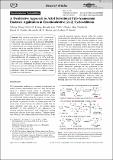Files in this item
A desilylative approach to alkyl substituted C(1)-ammonium enolates : application in enantioselective [2+2] cycloadditions
Item metadata
| dc.contributor.author | Wang, Yihong | |
| dc.contributor.author | Young, Claire Mary | |
| dc.contributor.author | Liu, Honglei | |
| dc.contributor.author | Hartley, Will | |
| dc.contributor.author | Wienhold, Max | |
| dc.contributor.author | Cordes, David Bradford | |
| dc.contributor.author | Slawin, Alexandra Martha Zoya | |
| dc.contributor.author | Smith, Andrew David | |
| dc.date.accessioned | 2022-08-09T10:30:23Z | |
| dc.date.available | 2022-08-09T10:30:23Z | |
| dc.date.issued | 2022-09-12 | |
| dc.identifier | 280489269 | |
| dc.identifier | 0c4e5f47-97da-4784-9e55-88bffab77e90 | |
| dc.identifier | 85135705428 | |
| dc.identifier | 000837483400001 | |
| dc.identifier.citation | Wang , Y , Young , C M , Liu , H , Hartley , W , Wienhold , M , Cordes , D B , Slawin , A M Z & Smith , A D 2022 , ' A desilylative approach to alkyl substituted C(1)-ammonium enolates : application in enantioselective [2+2] cycloadditions ' , Angewandte Chemie International Edition , vol. 61 , no. 38 , e202208800 . https://doi.org/10.1002/anie.202208800 | en |
| dc.identifier.issn | 1433-7851 | |
| dc.identifier.other | ORCID: /0000-0002-9527-6418/work/117211202 | |
| dc.identifier.other | ORCID: /0000-0002-5366-9168/work/117211250 | |
| dc.identifier.other | ORCID: /0000-0002-2104-7313/work/117211347 | |
| dc.identifier.uri | https://hdl.handle.net/10023/25798 | |
| dc.description | Funding: The research leading to these results has received funding from the CSC-St Andrews PhD Scholarship Scheme (Y.W.), the Newton Fellowship Programme (H.L.) and the Engineering and Physical Sciences Research Council, University of St Andrews, and the EPSRC Centre for Doctoral Training in Critical Resource Catalysis (CRITICAT) for financial support [Ph.D. studentship to W. H.; Grant code: EP/L016419/1]. | en |
| dc.description.abstract | The catalytic generation of C(1)-ammonium enolates from the corresponding α-silyl-α-alkyl substituted carboxylic acids using the isothiourea HyperBTM is reported. This desilylative approach grants access to α-unsubstituted and α-alkyl substituted C(1)-ammonium enolates, which are typically difficult to access through traditional methods reliant upon deprotonation. The scope and limitations of this process is established in enantioselective [2+2]-cycloaddition processes with perfluoroalkylketones (31 examples, up to 96% yield and >99:1 er), as well as selective [2+2]-cycloaddition with trifluoromethyl enones (4 examples, up to 75% yield and >99:1 er). Preliminary mechanistic studies indicate this process proceeds through an initial kinetic resolution of an in situ prepared (±)-α-silyl-α-alkyl substituted anhydride, while the reaction process exhibits overall pseudo zero-order kinetics. | |
| dc.format.extent | 9 | |
| dc.format.extent | 10162412 | |
| dc.language.iso | eng | |
| dc.relation.ispartof | Angewandte Chemie International Edition | en |
| dc.subject | B-lactone | en |
| dc.subject | Cycloaddition | en |
| dc.subject | Desilyation | en |
| dc.subject | Enolate | en |
| dc.subject | Isothiourea | en |
| dc.subject | QD Chemistry | en |
| dc.subject | DAS | en |
| dc.subject.lcc | QD | en |
| dc.title | A desilylative approach to alkyl substituted C(1)-ammonium enolates : application in enantioselective [2+2] cycloadditions | en |
| dc.type | Journal article | en |
| dc.contributor.sponsor | The Royal Society | en |
| dc.contributor.institution | University of St Andrews. School of Chemistry | en |
| dc.contributor.institution | University of St Andrews. Institute of Behavioural and Neural Sciences | en |
| dc.contributor.institution | University of St Andrews. EaSTCHEM | en |
| dc.identifier.doi | https://doi.org/10.1002/anie.202208800 | |
| dc.description.status | Peer reviewed | en |
| dc.identifier.grantnumber | NF170330 | en |
This item appears in the following Collection(s)
Items in the St Andrews Research Repository are protected by copyright, with all rights reserved, unless otherwise indicated.

